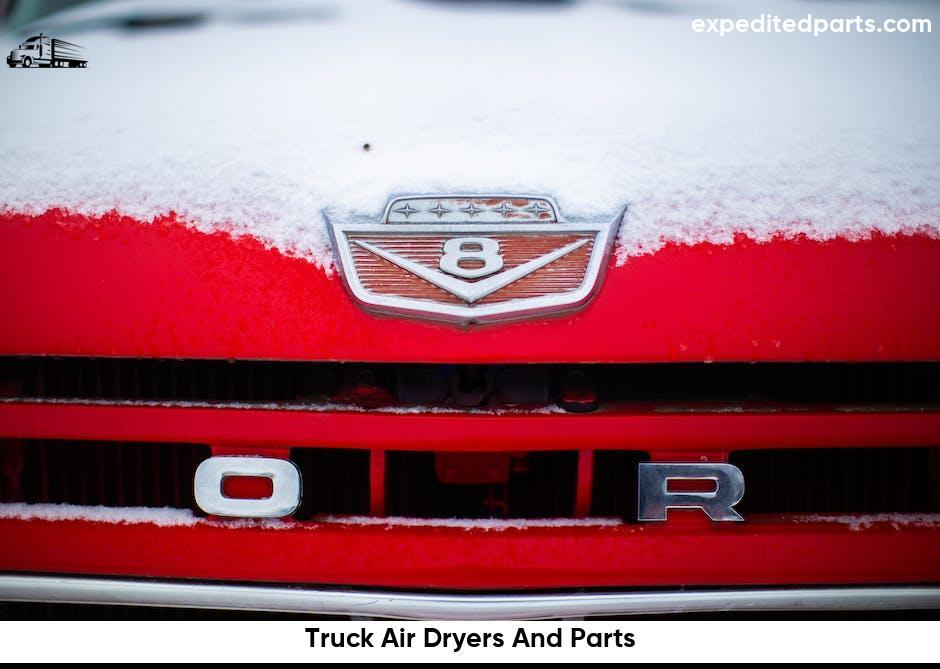Upgrade your truck’s air system with top-quality air dryers and parts. Improve efficiency and performance on the road. Say goodbye to moisture and hello to smooth operations!
Truck air dryers and parts play a crucial role in maintaining the efficiency and safety of commercial vehicles. These devices are designed to remove moisture and contaminants from the compressed air system, preventing potential damage to various components. By effectively drying the air, truck air dryers ensure optimal performance of the braking system, preventing potential accidents caused by reduced stopping power. Additionally, these parts help extend the lifespan of other critical components, such as air valves and air tanks, by reducing the risk of corrosion and moisture-related issues. With their importance in enhancing overall vehicle safety and performance, truck air dryers and parts are essential investments for any truck owner or fleet manager.

A Complete Guide to Truck Air Dryers: Everything You Need to Know
Truck air dryers play a crucial role in maintaining the efficiency and safety of commercial vehicles. They are responsible for removing moisture from the compressed air system, preventing water and contaminants from entering the air brake system. Understanding how truck air dryers work and their importance is essential for truck owners and operators.
Here is a comprehensive guide that covers everything you need to know about truck air dryers:
- Function: Truck air dryers are designed to remove moisture from the compressed air system by using a combination of mechanical and desiccant drying methods. This helps prevent water vapor from condensing and causing corrosion, freezing, and reduced braking performance.
- Components: A typical truck air dryer consists of several components, including a desiccant cartridge, purge valve, check valve, governor, and heater. Each component plays a crucial role in ensuring the proper functioning of the air dryer system.
- Types of Truck Air Dryers: There are two main types of truck air dryers: desiccant dryers and compressor integrated dryers. Desiccant dryers use a substance called desiccant to adsorb moisture from the compressed air, while compressor integrated dryers are built into the air compressor system.
- Benefits: Investing in a high-quality truck air dryer offers numerous benefits. It helps prolong the lifespan of the air brake system, reduces the risk of brake failure, improves braking performance, and ensures the safety of the driver and other road users.
- Maintenance: Regular maintenance and inspection of truck air dryers are essential for optimal performance. This includes replacing the desiccant cartridge, cleaning or replacing filters, checking for leaks, and ensuring proper functioning of all components.
- Choosing the Right Air Dryer: When selecting a truck air dryer, it is important to consider factors such as the size and capacity of the dryer, the requirements and specifications of your truck, and the environmental conditions in which the vehicle operates.
Here are some key benefits of using high-quality truck air dryers and parts:
- Improved Air Quality: High-quality air dryers effectively remove moisture, contaminants, and oil from the compressed air system. This ensures that only clean, dry air reaches the air brake system, preventing corrosion, freezing, and brake malfunction.
- Enhanced Braking Performance: By maintaining dry air in the brake system, high-quality air dryers and parts contribute to improved braking performance, allowing for quicker response times and increased stopping power. This is especially important in emergency situations or when carrying heavy loads.
- Reduced Maintenance Costs: Using high-quality air dryers and parts minimizes the risk of air brake system failures, ultimately reducing maintenance and repair costs. Regular inspections and timely replacement of components will help identify and address any issues before they escalate.
- Enhanced Safety: Reliable air brake systems are crucial for ensuring the safety of truck drivers, passengers, and other road users. High-quality air dryers and parts contribute to enhanced braking performance, reducing the risk of accidents and improving overall road safety.
The Essential Components of Truck Air Dryers and Parts
Truck air dryers are vital components in the air braking system of commercial trucks. They play a crucial role in removing moisture from the air supply, which ensures the safe and efficient operation of the braking system. Here are the essential components of truck air dryers and their functions:
- 1. Compressor: The compressor is responsible for compressing air, which is then sent to the air dryer.
- 2. Desiccant Cartridge: This cartridge contains a desiccant material, usually silica gel or activated alumina, which absorbs moisture from the compressed air.
- 3. Purge Valve: The purge valve is responsible for releasing the moisture-laden air from the air dryer. It opens periodically to allow the removal of trapped moisture.
- 4. Check Valve: The check valve prevents reverse airflow, ensuring that only clean, dry air flows into the air braking system.
These components work together to effectively remove moisture from the compressed air, preventing moisture-related issues such as freezing of air brake lines, corrosion of brake components, and loss of braking power. Regular maintenance and inspection of these components are crucial to ensure the proper functioning of truck air dryers and the overall safety of the vehicle.
Understanding the Role of Truck Air Dryers in Preventing Moisture Damage
Truck air dryers play a vital role in preventing moisture damage to the braking system of commercial trucks. Moisture can enter the compressed air system through various sources, such as ambient humidity and condensation. If left unchecked, this moisture can cause serious issues that compromise the safety and performance of the truck. Here is how truck air dryers help prevent moisture damage:
- 1. Moisture Removal: The primary function of a truck air dryer is to remove moisture from the compressed air. It does this by passing the air through a desiccant material that absorbs the moisture, ensuring that only dry air reaches the braking system.
- 2. Freezing Prevention: Moisture in the air brake system can freeze in cold weather conditions, leading to brake line blockages and loss of braking power. Truck air dryers eliminate moisture, reducing the risk of freezing and ensuring reliable braking performance even in freezing temperatures.
- 4. Improved Reliability: By maintaining dry air in the braking system, truck air dryers contribute to the overall reliability of the truck. Dry air reduces the risk of system malfunctions, ensures consistent braking performance, and enhances overall safety.
Truck air dryers are essential components that contribute to the safety, reliability, and longevity of commercial trucks. Regular maintenance and inspection of these air dryers are crucial to ensure their optimal performance and the prevention of moisture-related issues.
:
Choosing the Right Truck Air Dryer for Optimal Performance
When it comes to maintaining the optimal performance of your truck, selecting the right air dryer is crucial. A truck air dryer is responsible for removing moisture from the compressed air system, preventing it from causing damage to various components and ensuring efficient operation.
To choose the right truck air dryer, consider the following factors:
1. Size and capacity: Determine the appropriate size and capacity of the air dryer based on the volume of air flow required for your truck’s system. Consider factors such as vehicle size, air compressor specifications, and operating conditions.
2. Type of dryer: There are different types of air dryers available, such as desiccant dryers and refrigerated dryers. Desiccant dryers use a drying agent to absorb moisture, while refrigerated dryers cool the air to condense and remove moisture. Evaluate the specific needs of your truck’s air system to determine which type is most suitable.
3. Maintenance requirements: Consider the maintenance requirements of different air dryer models. Some may require regular filter replacements or servicing, while others may have low maintenance requirements. Choose a dryer that aligns with your maintenance capabilities and schedule.
:
Common Issues with Truck Air Dryers and How to Troubleshoot Them
Truck air dryers play a vital role in maintaining the proper functioning of the compressed air system. However, like any mechanical component, they can encounter issues that may affect their performance. Knowing how to troubleshoot common problems with truck air dryers can help you avoid costly repairs and minimize downtime.
Here are some common issues with truck air dryers and how to troubleshoot them:
1. Insufficient moisture removal: If the air dryer fails to adequately remove moisture from the compressed air, it may indicate a clogged or damaged dryer cartridge. Check and clean the dryer cartridge, ensuring it is free from debris or damage. If necessary, replace the cartridge to restore proper moisture removal.
3. Air leaks: Air leaks in the compressed air system can compromise the efficiency of the air dryer. Inspect all connections, fittings, and hoses for signs of leaks. Repair or replace any damaged or faulty components to eliminate air leaks and maintain optimal dryer performance.
4. Inconsistent cycling: If the air dryer cycles on and off too frequently or not frequently enough, it may indicate a faulty solenoid valve or pressure switch. Inspect these components for proper functioning and replace them if necessary.
5. Incorrect temperature control: For refrigerated air dryers, inaccurate temperature control can result in inadequate moisture removal. Check the temperature control settings and ensure they are correctly calibrated. Make any necessary adjustments to maintain the desired temperature and prevent moisture-related issues.
By addressing these common issues promptly and effectively, you can troubleshoot problems with your truck’s air dryer, optimize its performance, and ensure the reliable operation of the compressed air system.
In the transportation industry, fuel efficiency and safety are paramount. One key component that plays a crucial role in achieving both of these goals is an efficient truck air dryer. By effectively removing moisture from the air system, truck air dryers help prevent corrosion, reduce maintenance costs, and enhance overall performance.
- Corrosion Prevention: Moisture in the air system can lead to corrosion in various parts of the truck, including the brake lines, valves, and air tanks. This corrosion can compromise the integrity of these components, leading to possible failures and safety risks. An efficient truck air dryer removes moisture before it reaches these critical areas, significantly reducing the chances of corrosion.
Truck air dryers are an essential component of a vehicle’s braking system. They are responsible for removing moisture from the compressed air system, ensuring optimum brake performance and preventing corrosion. In recent years, there have been significant advancements in truck air dryer technology, aimed at improving efficiency, reliability, and overall performance.
Here are some of the latest technological advancements in truck air dryers:
1. Advanced Filtration Systems: Modern truck air dryers incorporate advanced filtration systems to effectively eliminate contaminants from the compressed air. These systems use high-quality filters that can trap even the smallest particles, ensuring clean and dry air supply to the braking system.
2. Intelligent Moisture Detection Sensors: Newer truck air dryers are equipped with intelligent moisture detection sensors that continuously monitor the moisture levels in the compressed air. These sensors can detect even minor fluctuations in moisture content and activate the dryer unit as needed, improving the overall efficiency of the system.
3. Energy-Efficient Design: Manufacturers are now focusing on developing energy-efficient truck air dryers. These units are designed to consume less power while maintaining optimal performance. Energy-saving features, such as variable speed motors and smart control systems, help reduce energy consumption and operating costs.
4. Integrated Diagnostic Systems: Some advanced truck air dryers feature integrated diagnostic systems that provide real-time monitoring and troubleshooting capabilities. These systems can detect any abnormalities or malfunctions in the dryer unit and alert the driver or maintenance personnel, allowing for quick and timely repairs.
5. Compact and Lightweight Designs: With advancements in technology, truck air dryers are becoming smaller and lighter without compromising their performance. Compact and lightweight designs make installation easier and also help improve overall fuel efficiency.
1. Regular Inspection: Conduct routine inspections of your truck air dryer and its components to check for any signs of wear and tear. Look out for leaks, cracks, or damaged filters. Address any issues promptly to prevent further damage and ensure optimal performance.
2. Clean Filters: Clean or replace the filters in your truck air dryer regularly. Dirty or clogged filters can hinder airflow and reduce drying efficiency. Follow the manufacturer’s guidelines for cleaning or replacing filters to maintain optimal moisture removal.
5. Follow Maintenance Schedule: Adhere to the maintenance schedule provided by the manufacturer. Regularly lubricate moving parts, inspect seals and gaskets, and perform any recommended maintenance procedures. This will help identify and address any potential issues before they escalate.
By implementing these tips, you can prolong the lifespan of your truck air dryer and associated parts, ensuring optimal performance and enhancing the safety and efficiency of your commercial vehicle. Regular maintenance and care contribute to the longevity of your truck air dryer and ultimately save you time and money on costly repairs or replacements.
For detailed information, you can contact us: Torque


